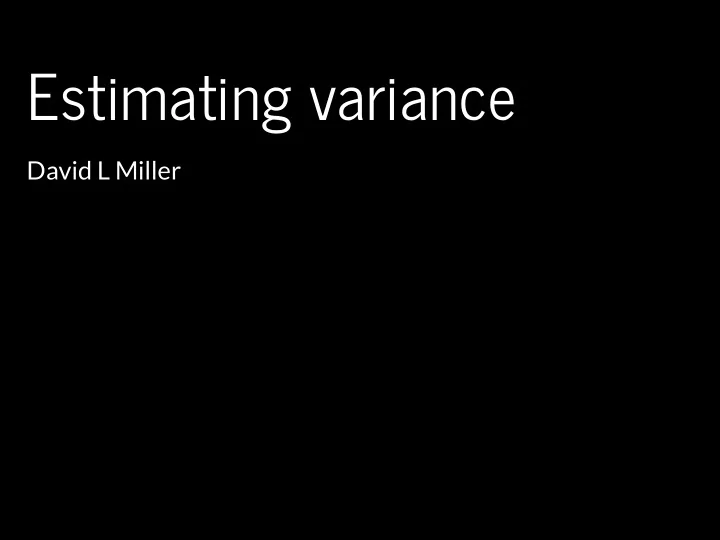

Estimating variance David L Miller
Now we can make predictions Now we are dangerous.
Predictions are useless without uncertainty We are doing statistics We want to know about uncertainty This is the most useful part of the analysis
What do we want the uncertainty for? Variance of total abundance Map of uncertainty (coefficient of variation)
Where does uncertainty come from?
Sources of uncertainty Detection function GAM parameters
Let's think about smooths first
Uncertainty in smooths Dashed lines are +/- 2 standard errors ^ How do we translate to ? N
Back to bases Before we expressed smooths as: ∑ K s(x) = k=1 β k b k (x) Theory tells us that: ^ V β β ∼ N( , ) β where is a bit complicated V β ^ Apply parameter variance to N
Predictions to prediction variance (roughly) “map” data onto fitted values X β “map” prediction matrix to predictions X p β Here need to take smooths into account X p pre-/post-multiply by to “transform variance” X p ⇒ X T p V β X p link scale, need to do another transform for response
Adding in detection functions
GAM + detection function uncertainty (Getting a little fast-and-loose with the mathematics) From previous lectures we know: ^ CV 2 N CV 2 ( ) ≈ (GAM) + CV 2 ( detection function )
Not that simple... Assumes detection function and GAM are independent Maybe this is okay?
A better way (for some models) Include the detectability as a “fixed” term in GAM Mean effect is zero Variance effect included Uncertainty “propagated” through the model Details in bibliography (too much to detail here)
That seemed complicated...
R to the rescue
In R... Functions in dsm to do this dsm.var.gam assumes spatial model and detection function are independent dsm.var.prop propagates uncertainty from detection function to spatial model only works for count models (more or less)
Variance of abundance Using dsm.var.gam dsm_tw_var_ind <- dsm.var.gam(dsm_all_tw_rm, predgrid, off.set=predgrid$off.set) summary(dsm_tw_var_ind) Summary of uncertainty in a density surface model calculated analytically for GAM, with delta method Approximate asymptotic confidence interval: 5% Mean 95% 1538.968 2491.864 4034.773 (Using delta method) Point estimate : 2491.864 Standard error : 331.1575 Coefficient of variation : 0.2496
Variance of abundance Using dsm.var.prop dsm_tw_var <- dsm.var.prop(dsm_all_tw_rm, predgrid, off.set=predgrid$off.set) summary(dsm_tw_var) Summary of uncertainty in a density surface model calculated by variance propagation. Quantiles of differences between fitted model and variance model Min. 1st Qu. Median Mean 3rd Qu. Max. -4.665e-04 -3.535e-05 -4.358e-06 -3.991e-06 2.095e-06 1.232e-03 Approximate asymptotic confidence interval: 5% Mean 95% 1460.721 2491.914 4251.075 (Using delta method) Point estimate : 2491.914 Standard error : 691.8776 Coefficient of variation : 0.2776
Plotting - data processing Calculate uncertainty per-cell dsm.var.* thinks predgrid is one “region” Need to split data into cells (using split() ) (Could be arbitrary sets of cells, see exercises) Need width and height of cells for plotting
Plotting (code) predgrid$width <- predgrid$height <- 10*1000 predgrid_split <- split(predgrid, 1:nrow(predgrid)) head(predgrid_split,3) $`1` x y Depth SST NPP off.set height width 126 547984.6 788254 153.5983 9.04917 1462.521 1e+08 10000 10000 $`2` x y Depth SST NPP off.set height width 127 557984.6 788254 552.3107 9.413981 1465.41 1e+08 10000 10000 $`3` x y Depth SST NPP off.set height width 258 527984.6 778254 96.81992 9.699239 1429.432 1e+08 10000 10000 dsm_tw_var_map <- dsm.var.prop(dsm_all_tw_rm, predgrid_split, off.set=predgrid$off.set)
CV plot p <- plot(dsm_tw_var_map, observations=FALSE, plot=FALSE) + coord_equal() + scale_fill_viridis() print(p)
Interpreting CV plots Plotting coefficient of variation Standardise standard deviation by mean ^ N ^ (per cell) CV = se( )/ N Can be useful to overplot survey effort
Effort overplotted
Big CVs Here CVs are “well behaved” Not always the case (huge CVs possible) These can be a pain to plot Use cut() in R to make categorical variable e.g. c(seq(0,1, len=100), 2:4, Inf) or somesuch
Recap How does uncertainty arise in a DSM? Estimate variance of abundance estimate Map coefficient of variation
Let's try that!
Recommend
More recommend